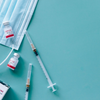Can I drink alcohol after getting the COVID-19 vaccine in 2022?

The Dietary Guidelines for America describe a moderate quantity of alcohol as two or less drinks per day for males and one drink or less per day for women, according to the Centers for Disease Control and Prevention (CDC) Trusted Source.
The consequences of excessive drinking, or "binge drinking," on the efficacy of the COVID-19 vaccination have not yet been studied. To be on the safe side, it's probably a good idea to limit your alcohol intake in the days after a vaccination.
Let's have a look at how alcohol affects your immune system and if it's okay to drink after receiving a COVID-19 vaccination.
COVID-19 vaccinations are designed to assist your immune system in recognising the virus that causes COVID-19 as a foreign intruder.
It is presently unknown how alcohol intake impacts vaccination response. COVID-19 before the FDA approved vaccinations for emergency use in the United States, they had to go through rigorous clinical trials to ensure their safety. These studies did not look at how alcohol impacts vaccine efficacy. It is unlikely that moderate drinking in the days after your vaccination would impair its efficacy.
Some preliminary research has discovered some evidence that moderate alcohol intake is connected with enhanced cardiovascular health and perhaps immunological health in monkeys, rats, and humans. However, much more study is required to back up these conclusions.
To be on the safe side, it's preferable to either maintain or limit your alcohol intake for at least a few days following having your immunisation.
According to Reuters, a Russian health official issued a warning in December 2020 that anyone receiving the Sputnik V COVID-19 vaccination should avoid alcohol for two weeks before and four weeks after their first shot.
Dr. Alexander Gintsburg, the head of the research team that developed the Sputnik V vaccine, has subsequently stated on the official Sputnik V social media account that a total prohibition on alcohol is not essential and that moderate use ’s Fine. He suggested avoiding from alcohol for three days following each injection or vaccination.
Alcohol and blood clot
Some COVID-19 vaccinations, such as those manufactured by Johnson & Johnson and AstraZeneca, have been linked to a disease known as cerebral venous sinus thrombosis (CVST) in exceedingly rare occurrences. CVST is a blood clot in the brain sinuses.
According to a CDC study, according to a reliable source, just nine cases of CVST have been documented despite the administration of almost 200 million vaccinations.
According to the Italian Society on Drinking, alcohol is associated with poor platelet function, which may raise the risk of coagulation disorders such as CVST. It's conceivable that frequent drinking combined with vaccination contributed to the development of this uncommon problem, but more research is needed to determine if this is the case.
Other measures to take after receiving a COVID-19 vaccination
The great majority of patients who get the COVID-19 vaccination have relatively minor side effects. The most frequent symptom of the Pfizer-BioNTech vaccine, for example, is pain around the vaccination site.
It's a good idea to timing your vaccination for the end of the day or when you have some rest in case you get headaches or fatigue.
If you have any of the following symptoms, you can use over-the-counter pain killers.
Muscle discomfort
joint ache
headaches
discomfort at the injection site
The bottom line
A reasonable amount of alcohol is unlikely to interfere with your reaction to the COVID-19 vaccination. To be on the safe side, it's probably a good idea to limit your alcohol consumption.
It's possible that reducing or eliminating your alcohol intake would boost your vaccination response, but there's no scientific data to support this.
It's probably a good idea to refrain from excessive or binge drinking for at least a few days following each dosage of your vaccination. Just in case if you have exceeded your limit, Upswing® with our clinical proven formula will always be here to prevent your anxiety for hangovers. We are here to protect your productive morning 24/7.















